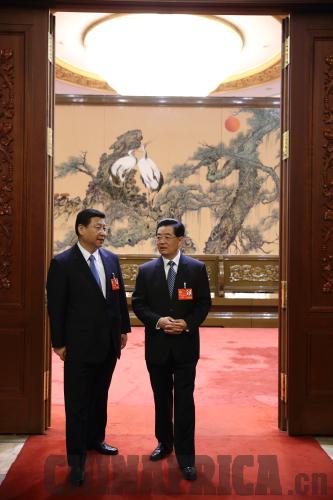|
 |
| SMOOTH TRANSITION: Chinese leaders Hu Jintao and Xi Jinping chat following the first meeting of the presidium of the 18th CPC National Congress in Beijing on November 7 |
Better lives
Wan Yu, a delegate from northeast China's Jilin Province, said she was excited and heartened after hearing the report delivered by Hu. Wan, principal of a school for orphans in the provincial capital Changchun, said she was glad that the report gave priority to improving people's livelihoods and enabling them to benefit substantially from China's development. In her view, these messages are a blessing to orphans, a vulnerable and often marginalized group.
"Grand goals such as a moderately prosperous society and social harmony come down to raising people's living standards," said Xie Chuntao, a professor with the Party School of the CPC Central Committee. Hu Jintao's report to the 18th CPC National Congress called for further improvements in crucial social services such as education, social security and healthcare.
With a higher bar, pressures on the new leadership are daunting, said Kerry Brown, Executive Director of the China Studies Center of the University of Sydney. "There are great challenges of social cohesion, inequality and balance in the hardware and software of society," Brown said. "For the new leadership, these challenges will only grow in complexity as China becomes a middle-income country."
The report also set the goal of doubling China's 2010 GDP and the per-capita income of urban and rural residents by 2020. It was the first time for the CPC to include per-capita income in China's 2020 blueprint for a moderately prosperous society. Previous targets merely called for GDP growth.
The per-capita disposable income of urban residents in China rose 8.4 percent to 21,810 yuan ($3,498) in 2011 from a year earlier after deducting inflation, according to the National Bureau of Statistics. Meanwhile, the per-capita net income of rural residents grew 11.4 percent year on year to 6,977 yuan ($1,119).
Despite the global economic slowdown, the CPC has promised to make this goal a reality - a pledge that highlights its devotion to the well-being of Chinese people, Xie said.
Fewer than 2 billion people worldwide currently enjoy the standard of living as envisioned in a moderately prosperous society, said Hu Angang, a renowned economist with Tsinghua University and a delegate to the 18th CPC National Congress. When the goal is realized, 1.3 billion Chinese will join this group of affluent people, marking an unprecedented improvement in the well-being of mankind, he said.
"My core argument is that China's success is a success for the world and China's failure is a failure for the world," he said, adding that China will not fail.
In a report published in early November, the Paris-based Organization for Economic Cooperation and Development said China will overtake the United States by 2016 to become the world's largest economy.
The International Monetary Fund also predicted in April that China's economy will be bigger than that of the United States by 2016 in terms of purchasing power parity.
|